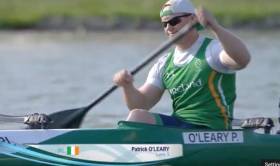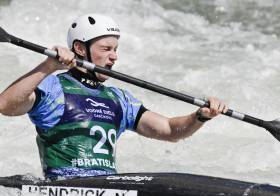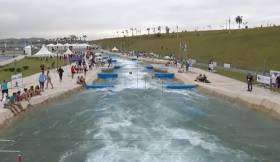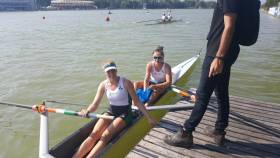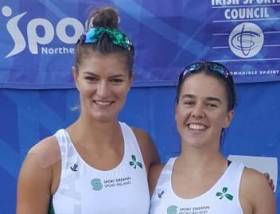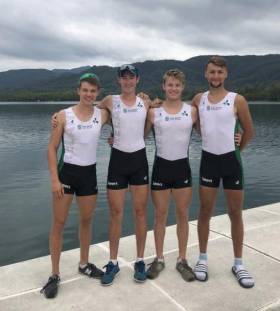Displaying items by tag: World Championships
#Canoeing: Patrick O’Leary realised his dream of qualifying his boat for his second successive Paralympic Games today. The Ireland canoeist finished fifth in the A Final of the VL3 200 metres at the canoe sprint World Championships in Szeged, Hungary. Curtis McGrath of Australia took the gold. O’Leary, who had won his semi-final, was in fourth or fifth right through a race in which six boats qualified for Tokyo.
Barry Watkins missed out on a chance of qualifying for the Olympic Games in the K1 500. The Irishman took sixth in his semi-final and will compete in a B Final.
Canoe Sprint World Championships, Szeged, Hungary (Irish interest)
Men
K1 500 Semi-Final Three: 6 Ireland (B Watkins) 1:40.38.
Paracanoeing – Men’s VL3 200m A Final (Top six nations qualify for Paralympic Games): 1 Australia (C McGrath) 47.42 seconds; 5 Ireland (P O’Leary) 49.27.
McClure and Hendrick Best of Irish in Spain and Slovakia
#Canoeing: David McClure finished fifth in the final of the K1 Surface event at the canoe freestyle World Championships in Sort in Spain. At the canoe slalom European Under-23 Championships, Noel Hendrick reached the semi-finals and finished 26th in Liptovsky Mikulas in Slovakia. The Irishman had touches on gates three and 17, incurring four seconds in penalties.
Puspure Honoured for World-Beating Year
#Rowing: The Afloat Rower of the Year 2018 is Sanita Puspure. The Old Collegians competitor proved herself the best single sculler in the world. She took silver at the World Cup regattas in Belgrade and Lucerne, running the defending champion, Jeannine Gmelin of Switzerland, extremely close (.23 of a second) in the Lucerne final.
Working with coach Dave McKenzie McGowan and high performance director Antonio Maurogiovanni, who set a very heavy training schedule, Puspure decided to miss the European Championships so that she could concentrate on the World Championships in Plovdiv in Bulgaria in September. She won her heat and semi-final, and then overcame bobbly conditions in the final. She established a clearwater lead. Gmelin came back at her in the third quarter; Puspure was not for catching. She won by two lengths of clear water.
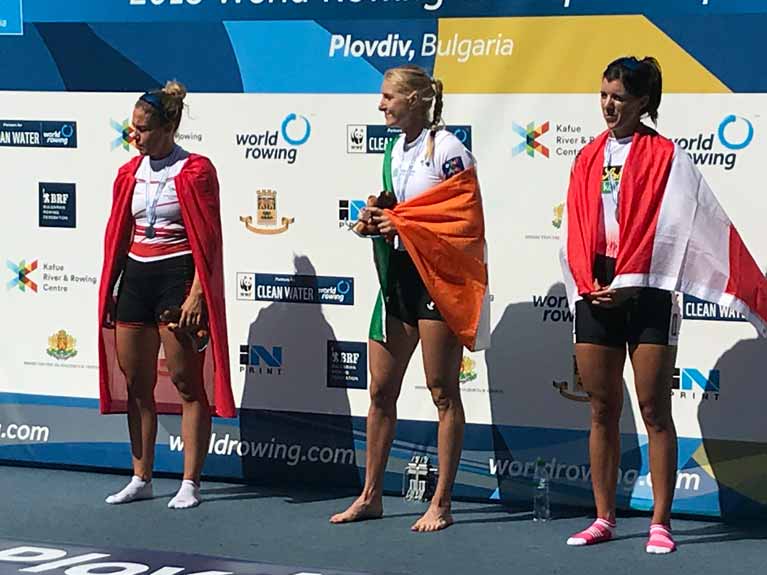 Sanita Puspure (centre) smiles after being presented with her gold medal at the World Championships. Jeannine Gmelin (silver) is on the left and Magdalena Lobnig (bronze) on the right. Photo: Liam Gorman
Sanita Puspure (centre) smiles after being presented with her gold medal at the World Championships. Jeannine Gmelin (silver) is on the left and Magdalena Lobnig (bronze) on the right. Photo: Liam Gorman
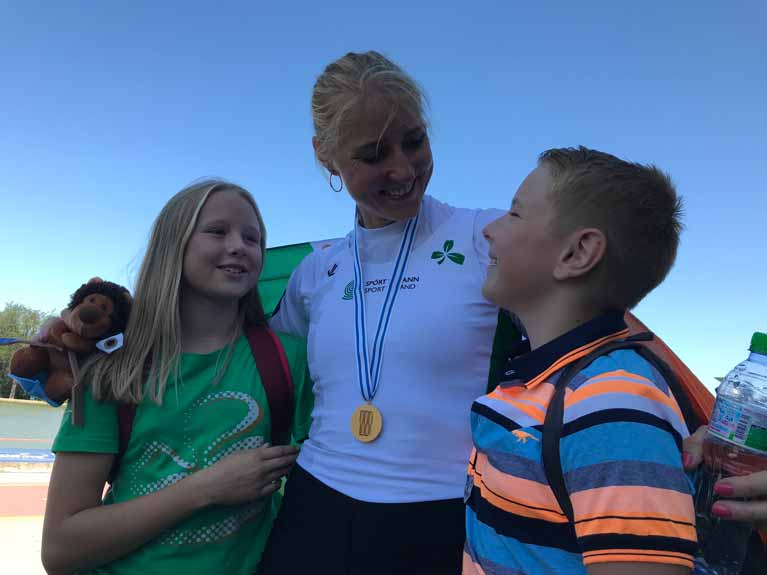 Sanita with Daniella and Patrick, her children, after winning World Championship gold. Photo: Liam Gorman
Sanita with Daniella and Patrick, her children, after winning World Championship gold. Photo: Liam Gorman
The win was a twin highlight at the end of a wonderful year. The O’Donovan brothers, Gary and Paul, won the lightweight double sculls gold in Plovdiv, making history as the first Ireland crew to take World Championship gold in an Olympic boat. They overcame terrible conditions and a poor lane draw to win in the quarter-final. This was succeeded by a semi-final in which they looked tired and could only take third. The final saw them in the unfavoured lane six for the final.
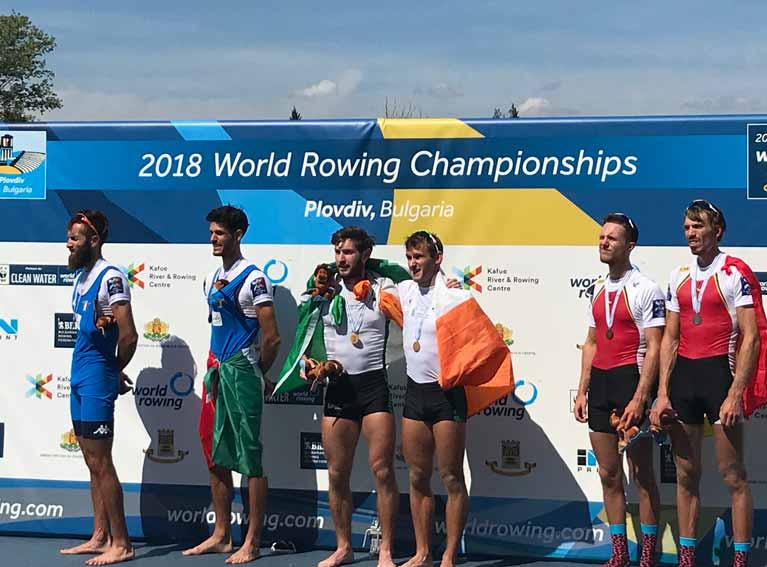 Ireland gold medalists Gary and Paul O'Donovan on the World Championship podium in Plovdiv, Bulgaria, with Italy (silver) and Belgium (bronze)
Ireland gold medalists Gary and Paul O'Donovan on the World Championship podium in Plovdiv, Bulgaria, with Italy (silver) and Belgium (bronze)
In a stirring race, the Skibbereen men saw off Italy. They would describe it as the best race they had ever rowed. They were outstanding in their steadiness, and over the second, third and fourth quarters they were the fastest crew. They took over the lead from Italy between 1200 and 1500 metres and rebuffed the charge by the men in blue to win by three-quarters of a length.
In a first for a women’s sweep crew from this island in an Olympic boat, Aifric Keogh and Emily Hegarty, the Ireland women’s pair, also reached an A Final at the World Championships. The World Under-23 Championships were also laden with success, with four A Finalists, gold for Shane Mulvaney and David O’Malley in the lightweight pair and silver for Miles Taylor, Niall Beggan, Ryan Ballantine and Andrew Goff in the lightweight quadruple.
Come the Fisa World Rowing Awards, Dominic Casey was honoured as the coach of the year.
In a season of success, Sanita Puspure is the Afloat Rower of the Year.
Afloat Rower of the Month awards: The judging panel is made up of Liam Gorman, rowing correspondent of The Irish Times, and David O'Brien, editor of Afloat magazine. Monthly awards for achievements during the year appeared on afloat.ie.
O'Donovan Brothers & Puspure Chosen as Afloat Rowers of Month
#Rowing: Ireland’s gold medallists at the World Championships, Paul and Gary O’Donovan and Sanita Puspure, are the Afloat Rowers of the Month for September.
The whole Ireland team performed with merit at the regatta in Plovdiv in Bulgaria and there were a number of outstanding placings. The men’s lightweight quadruple reached their A Final, while Philip Doyle and Ronan Byrne finished ninth overall in the men’s double sculls.
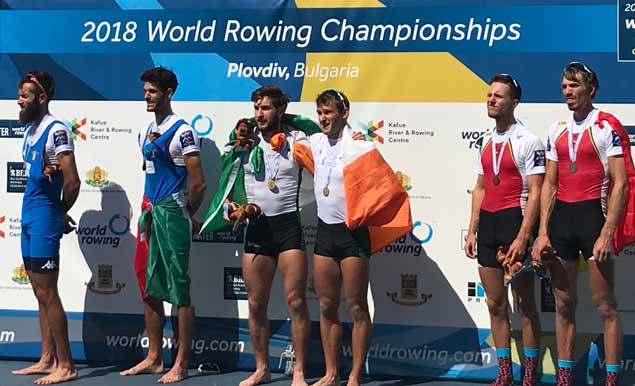 Gary and Paul on the podium in Plovdiv with Italy and Belgium Photo: Liam Gorman
Gary and Paul on the podium in Plovdiv with Italy and Belgium Photo: Liam Gorman
The women’s pair of Aifric Keogh and Emily Hegarty swept into the A Final, one of the real shocks of the Championships. They took sixth.
The O’Donovan brothers had to battle through a terrible lane draw on the Wednesday to reach Thursday’s semi-final. It left them tired and they made it through to the final by taking the third qualification place in the semi-final with just 1.52 seconds to spare over Poland. Come the final it was a step up; a step into history. They made light of their outside lane with a sweet and powerful row they deemed their best ever as a lightweight double. Italy could not live with it and Ireland had won their first ever gold medal in an Olympic event at a World Championships.
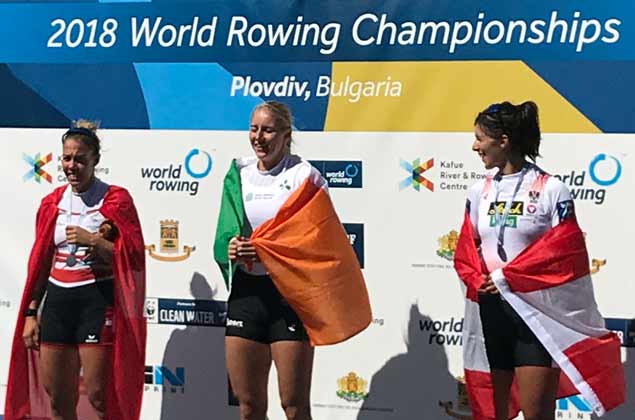 Sanita Puspure on the podium in Plovdiv Photo: Liam Gorman
Sanita Puspure on the podium in Plovdiv Photo: Liam Gorman
The women’s single sculls has been a fascinating event for years. Australia’s Kim Crow (now Brennan) was the star who shone all the way to a golden show in Rio in 2016; latterly Switzerland’s Jeannine Gmelin has been a winner. And now the time had come for Ireland’s Sanita Puspure. She won the heat and the semi-finals with elan, as if impatient to take on and beat Gmelin. She did this despite having to deal with choppy conditions in the final and she clipped a buoy. However, Puspure was never headed from early on, and she won with over two lengths to spare. For seven minutes and 20.12 seconds she was, indeed, dominant.
Congratulations to all the Ireland teams this season and to the Afloat Rowers of the Month, Sanita Puspure and Paul O’Donovan and Gary O’Donovan.
Rower of the Month awards: The judging panel is made up of Liam Gorman, rowing correspondent of The Irish Times and David O'Brien, Editor of Afloat magazine. Monthly awards for achievements during the year will appear on afloat.ie. Keep a monthly eye on progress and watch our 2018 champions list grow.
Jegou Takes His Bow in World Championship Semi-Final
#Canoeing: Ireland’s Liam Jegou finished 24th in the semi-final of the canoe slalom World Championships in Rio de Janeiro. The C1 paddler incurred four seconds of penalties for touches on gate one and gate 10 which cost him his chance of making the top 10 and Saturday’s final.
Canoe Slalom World Championships, Rio de Janeiro: C1 Semi-Final (First 10 to A Final): 24 Ireland (L Jegou) 110.04 seconds.
World Championship Gold for Puspure and Ireland
#Rowing: Sanita Puspure won Ireland’s second gold medal at the World Rowing Champinships at Plovdiv in Bulgaria today. She grabbed the lead in the single sculls final right from the start and never let it go. Defending champion Jeannine Gmelin moved to catch her in the third quarter, but the Ireland sculler stayed strong and extended her lead. She tired a little in the final quarter – and grew her advantage even more. She was clear by over two lengths at the finish.
World Rowing Championships, Plovdiv, Bulgaria, Day Eight (Irish interest):
Men
Double Sculls – B Final (Places 7 to 12): 1 Netherlands 6:05.10, 2 Poland 6:05.10, 3 Ireland (P Doyle, R Byrne) 6:08.81.
Women
Double Sculls – C Final (Places 13 to 18): 1 Ireland (M Dukarska, A Crowley) 6:54.55, 2 Chile 6:57.29, 3 Italy 6:58.17.
Single Sculls – A Final: 1 Ireland (S Puspure) 7:20.12, 2 Switzerland (J Gmelin) 7:25.93, 3 Austria (M Lobnig) 7:29.51.
Casey and Walsh Finish World Championships With C Final Win
#Rowing: Ireland’s Aoife Casey and Denise Walsh showed the Skibbereen skill for sprinting to good effect as they worn their C Final of the women’s lightweight double sculls at the World Championships in Plovdiv. They were fourth at 500 metres, but they sped up the rankings through the middle 1,000 and led with 500 metres to go. They took it home from there, with Austria second and Germany third. Ireland placed 13th in the World because of this result.
Shane O’Driscoll and Mark O’Donovan took fourth in their C Final, 16th overall, in the men’s pair. The race was won by Australia’s Andrew Judge and Joseph O’Brien, while O’Donovan and O’Driscoll produced a remarkable change of pace to challenge the leaders, but Poland and the United States had pushed in between them and the leaders on the line.
World Rowing Championships, Plovdiv, Bulgaria, Day Seven (Irish interest):
Men
Pair – C Final (places 13 to 18): 1 Australia 6:23.81; 4 Ireland (M O’Donovan, S O’Driscoll) 6:29.19.
Lightweight Double Sculls – A Final: 1 Ireland (G O’Donovan, P O’Donovan) 6:06.81, 2 Italy 6:08.31, 3 Belgium 6:11.25.
Women
Pair – A Final: 1 Canada 6:50.67, 2 New Zealand 6:52.96, 3 Spain 7:04.60; 6 Ireland (A Keogh, E Hegarty) 7:15.70.
Lightweight Double Sculls – C Final (places 13 to 18): 1 Ireland (A Casey, D Walsh) 7:05.77, 2 Austria 7:08.29, 3 Germany 7:09.12.
Sixth Place for Hegarty and Keogh in World Rowing Final
#Rowing: Ireland finished sixth in the A Final of the women’s pair at the World Rowing Championships in Plovdiv, Bulgaria. New Zealand and Canada covered the first 500 metres best, but Aifric Keogh and Emily Hegarty passed through that mark at the back of the field. The pattern of the race developed in the same way: Canada came through New Zealand by the finish, and the two took gold and silver. Spain won a battle with Italy to take bronze. Keogh and Hegarty skirmished with China coming into the closing stages but eventually took the final spot.
World Rowing Championships, Plovdiv, Bulgaria, Day Seven (Irish interest):
Women
Pair – A Final: 1 Canada 6:50.67, 2 New Zealand 6:52.96, 3 Spain 7:04.60; 6 Ireland (A Keogh, E Hegarty) 7:15.70.
Crowley and Dukarska Miss Out at World Championships
#Rowing: Ireland’s Monika Dukarska and Aileen Crowley finished fifth in their repechage and missed out on the A/B semi-finals of the double sculls at the World Rowing Championships in Plovdiv, Bulgaria. The race featured a very close finish, with the Czech Republic overtaking the long-time leaders, Germany, on the line while Poland pulled out an outstanding sprint to take the crucial third place away from Chile. Ireland will go to the C/D semi-finals.
World Rowing Championships, Plovdiv, Bulgaria, Day Four (Irish interest)
Men
Lightweight Quadruple Sculls – Repechage One (First Two to A Final): 1 Turkey 5:51.12, 2 Ireland (F McCarthy, R Ballantine, J McCarthy, A Goff) 5:54.09
Women
Double Sculls – Repechage Three (First Three to A/B Semi-Finals): 1 Czech Republic 7:00.07, 2 Germany 7:00.30, 3 Poland 7:00.48; 5 Ireland (M Dukarska, A Crowley) 7:03.48
Ireland Lightweight Quadruple Qualifies for World Rowing Final
#Rowing: Ireland’s lightweight quadruple of Fintan McCarthy, Ryan Ballantine, Jake McCarthy and Andrew Goff secured an A Final place at the World Rowing Championships in Plovdiv, Bulgaria, this morning. They took the second and final qualification place in their repechage. Turkey and Ireland showed they meant business right through the race, with only Algeria and then Norway showing signs of being able to upset this leading order. Turkey were excellent in the second half of the race, moving over a length clear of Ireland, who were content to find their way to the final.
World Rowing Championships, Plovdiv, Bulgaria, Day Four (Irish interest)
Lightweight Quadruple Sculls – Repechage One (First Two to A Final): 1 Turkey 5:51.12, 2 Ireland (F McCarthy, R Ballantine, J McCarthy, A Goff) 5:54.09


























